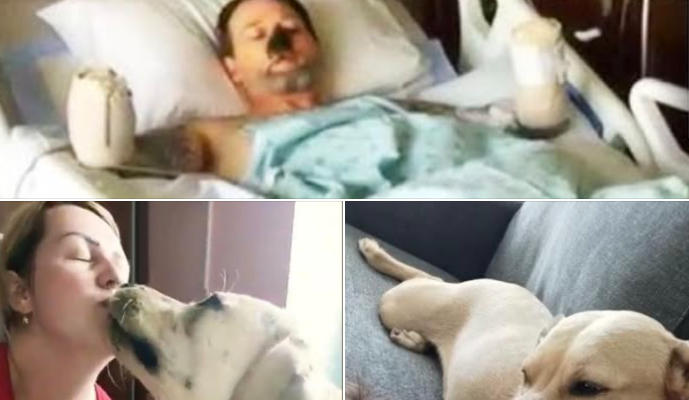Many individuals find it difficult to resist the affectionate kisses of a charming dog or cat, even when they are aware of the places their beloved pet’s tongue may have been.
But many people are either unaware – or don’t care – that allowing a dog or cat to kiss your face can lead to serious bacterial infections, which can lead to potential loss of limbs or even, in some cases, be fatal!
Individuals typically align with one of two perspectives regarding the allowance of a pet’s tongue to make contact with their lips.
One perspective is characterized by enthusiasm, while the other expresses a clear preference against it.
Although the affectionate gestures of puppies and kittens can be charming, reflecting on the various places their tongues may have been—such as their own bodies or contaminated areas—can diminish the appeal of such displays of affection.

Furthermore, although your pet may be enjoying the opportunity to lick a clean portion of your skin, what they leave behind could pose serious health risks to humans.
A TikTok user states, “Do you kiss your dog on the mouth? If so, it is advisable to reconsider this practice.”
The individual, known by the username “medexplained2you,” identifies as a physician’s assistant and includes a disclaimer on their profile to preempt any potential backlash, clarifying that their content does not constitute professional medical advice.

One could potentially face the loss of limbs as a consequence. He elaborates, “Regrettably, I am not joking, as kissing your dog on the mouth may lead to an infection caused by a bacterium known as Capnocytophaga Canimorsus.”
The Centers for Disease Control and Prevention (CDC) indicates that Capnocytophaga is a bacterium found in the mouths of dogs and cats. These germs, which do not harm cats or dogs, can be transmitted to humans through bites, scratches, and other intimate interactions with household pets.
The CDC states, “Capnocytophaga infection can result in severe complications, such as heart attacks, kidney failure, and gangrene. In some cases, individuals may require the amputation of fingers, toes, or even limbs due to complications arising from a serious infection.”

The Centers for Disease Control and Prevention (CDC) indicates that individuals infected with the disease typically begin to exhibit symptoms within a timeframe of three to five days. Furthermore, approximately 30% of those who experience a severe form of the infection, such as sepsis, may succumb to it.
Although infrequent, there have been instances of rapid disease progression resulting in death among immunocompromised individuals. Additionally, older adults, heavy alcohol consumers, and individuals lacking a spleen face an elevated risk.
In a cautionary message regarding the potential hazards of pet saliva entering the mouth, a TikTok user elaborates that “depending on the speed of progression and the timing of diagnosis, amputation may ultimately be the sole treatment option.”
Kiss of death?
Over the past few years, there have been a few cases involving Capnocytophaga that have received a lot of attention.

In August 2022, South African actress Charlbi Dean passed away unexpectedly due to bacterial sepsis. The 32-year-old, known for her role in Triangle of Sadness, had undergone a splenectomy following a car accident in 2009, a factor that her family believes may have accelerated the infection’s severity.
The medical examiner did not determine whether the infection in Dean’s case was linked to an animal source.
In a separate incident in 2019, Marie Trainer from Ohio suffered the amputation of both her hands and legs after contracting a rare infection from her German shepherd puppy, Taylor, who licked a wound. Despite facing life-threatening circumstances, Trainer expressed her unwavering commitment to her two dogs, even allowing them to visit her during her hospital stay.
“They brought them here two times at the hospital so I can see them and that just put the biggest smile on my face,” she told CNN.
Meanwhile, in June 2018, the alarm was sounded when doctors found the bacteria Capnocytophaga canimorsus in two unrelated Wisconsin patients.
Milwaukee resident Sharon Larson, aged 58, passed away following a minor bite from her dog. In the same month, Greg Manteufel, 48, from West Bend, underwent a lifesaving surgery that resulted in the amputation of both his hands and lower legs. Manteufel indicated that he had interacted with several dogs but had not been bitten.
Both individuals were described as healthy prior to these incidents, indicating that anyone may be susceptible to capnocytophaga.
‘Easy fix’
The TikTok user warns, “Why not avoid all that trouble and stop tonguing your dog. Seems like an easy fix to me.”
But the majority of netizens were unimpressed by his advice and pet lovers scoffed over the suggestion of not kissing your fur child.
One user writes, “I’ve been doing it for 60 years and I still have all my limbs!!” A second shares, “Nah I’m just gonna have to take that risk… that’s my son.”
A third individual remarked, “I will never cease. They are not merely dogs; they are my sons.”
Others found amusement in the post, commenting that dogs possess cleaner mouths than certain individuals.
“I have kissed a few dogs in my lifetime, but not the four-legged variety,” one person shared, while another added, “Kissing my husband is not any better.”
In the meantime, several internet users expressed their gratitude for the TikTok user’s advice.
One shares, “Absolutely agree!!!! I grew up knowing this. I can’t believe people let dogs kiss even kids’ mouth.” Another adds, “Louder please. So the ones with newborn babies stop thinking it’s cute to let the dog kiss the babies in the mouth.”
What are your thoughts on this story? Do you let your dog or cat lick your lips? Let us know in the comments.
Please share this story and let’s hear what others have to say!



